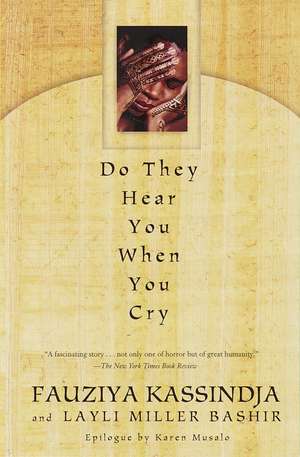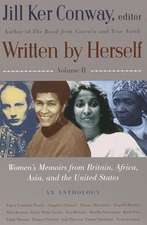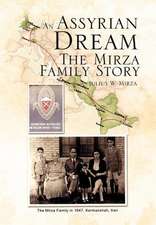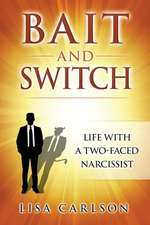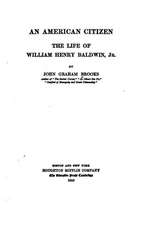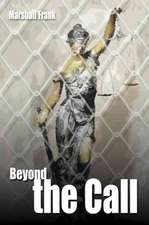Do They Hear You When You Cry
Autor Fauziya Kassindja, Layli Miller Bashiren Limba Engleză Paperback – 31 dec 1998
This is her story--told in her own words--of fleeing Africa just hours before the ritual kakia was to take place, of seeking asylum in America only to be locked up in U.S. prisons, and of meeting Layli Miller Bashir, a law student who became Fauziya's friend and advocate during her horrifying sixteen months behind bars. Layli enlisted help from Karen Musalo, an expert in refugee law and acting director of the American University International Human Rights Clinic. In addition to devoting her own considerable efforts to the case, Musalo assembled a team to fight with her on Fauziya's behalf. Ultimately, in a landmark decision in immigration history, Fauziya Kassindja was granted asylum on June 13, 1996. Do They Hear You When You Cry is her unforgettable chronicle of triumph.
Preț: 137.10 lei
Nou
Puncte Express: 206
Preț estimativ în valută:
26.23€ • 28.59$ • 22.11£
26.23€ • 28.59$ • 22.11£
Carte tipărită la comandă
Livrare economică 23 aprilie-07 mai
Preluare comenzi: 021 569.72.76
Specificații
ISBN-13: 9780385319942
ISBN-10: 0385319940
Pagini: 544
Dimensiuni: 130 x 201 x 33 mm
Greutate: 0.57 kg
Editura: DELTA
ISBN-10: 0385319940
Pagini: 544
Dimensiuni: 130 x 201 x 33 mm
Greutate: 0.57 kg
Editura: DELTA
Notă biografică
Fauziya Kassindja was born in 1977 in Kpalimé, Togo, Africa, and now resides in Alexandria, Virginia.
Layli Miller Bashir, a graduate of American University Washington College of Law, is now an attorney practicing in Washington, D.C. She is also the founder of the Tahirih Justice Center, which assists women facing international human rights abuses. She lives in Virginia with her husband.
Layli Miller Bashir, a graduate of American University Washington College of Law, is now an attorney practicing in Washington, D.C. She is also the founder of the Tahirih Justice Center, which assists women facing international human rights abuses. She lives in Virginia with her husband.
Extras
Prison
I returned to my cell after lunch. It was time for the Salat adh-Dhuhr.
I removed my shoes and washed my face, arms, feet and hands at the small sink. Then I carefully spread the bedsheet I used as a prayer rug on the cold concrete floor. I wrapped my head and neck in the veil we call a mayahfi, stepped on the sheet that faced East and began to pray. While I was kneeling on the sheet, clutching the ninety-nine beads of the tasbih...
"Kasinga!" My neck jerked upward when I heard the sound of my name come crackling out through the prison intercom system.
"Kasinga! Attorney visit!"
So they were here. But I wanted to finish my prayers.
Allau Akbar, Allau Akbar, Allau Akbar--
"Kasinga! Kasinga!"
I stood up, unwrapped my mayahfi, slowly laced my sneakers, and stepped onto the ramp outside my cell. Upper tier in B pod, maximum security, York County Correctional Facility in Pennsylvania--this was where I lived.
Down below me I could see the dayroom, a small, barren space with metal tables and stools bolted to the floor. Inmates in blue uniforms passed their time aimlessly, watching TV, playing cards, talking, and staring into space. I slowly made my way along the ramp to the stairway and down the stairs. The guard in the booth tried to hurry me along by shouting my name repeatedly over the loudspeaker, but I wouldn't be rushed. I was still reciting my prayers. I had learned that prayer was what kept me going, enabling me to see beyond the grim gray walls of this place I was forced to call home.
By the time I reached the door to the hall, it had been opened from the control booth. A guard stood waiting in the doorway. She waved me through. "Let's go, let's go!" We turned right and walked a few paces to a doorway. "In here," she said, motioning me into a small meeting room with four metal chairs and a metal table against the far wall. "Wait here," she said, closing the door behind her. I walked to the chair nearest the table, sat down, and waited for my visitors.
It was Saturday afternoon, February 10, 1996, my fourteenth month in prison, six weeks after my nineteenth birthday.
Back home in Togo, when my father was still alive and our family was still together in my father's house, my mother would fast on my birthday. She fasted on all her children's birthdays to thank Allah for keeping us well. Where was my mother now? Had she remembered to fast on my birthday this year? I hadn't seen her in almost three years, since my father's sister, Hajia Mamoud, evicted her from our house, four months and ten days after my father's death.
It was because of Hajia Mamoud and my father's brother, Malam Mouhamadou, that I was now thousands of miles away from everything and everyone I loved. When my father died, Malam Mouhamadou became my legal guardian. He and Hajia Mamoud sold me into marriage to a man almost thirty years my senior who already had three wives. This man wanted my woman parts cut off before taking me as his wife. It is a traditional practice in my tribe, which we call kakia. Most people call it female circumcision. But that doesn't really describe what kakia is. Since I've been in this country, I've heard people refer to kakia as female genital mutilation. Mutilation. Yes, that's the right name.
Traditional though my father was, he had opposed this practice, so my older sisters were spared. But I was the youngest of the five girls, and after my father's death there was no one to protect me. When my aunt told me she had arranged my marriage and that I was to be cut, I was terrified because I had known girls who had died from having it done. My mother's own sister had died from it, and I'd heard my parents speak of this event with horror. But my "husband," like most men in our tribe, wanted me to be cut so that I would be "clean" for him. So my aunt had arranged for the women who do it to come to our house.
I've heard that during the procedure, four women spread your legs wide apart and hold you down so that you can't move. And then, the eldest woman takes a knife that is used to cut hair and scrapes your woman parts off. There are no painkillers, no anesthesia. The knife isn't sterilized. Afterward, the women wrap your legs from your hips to your knees and you have to stay in bed for forty days so the wound can close. After the forty days, you are "reborn" for your husband, and delivered to his house to begin your new life as his wife.
This would have happened to me had I stayed in Togo. It happens every day to girls all over the world. But with the help of my oldest sister and money from my mother, I ran away, far from my home, my family, and my country. Eventually I made it to America where I thought I'd be taken in, where I thought I would be safe. But instead of finding safety, I'd found a jail cell--or actually a series of cells. I was now in my fourth prison. I had been beaten, teargassed, kept in isolation until I nearly lost my mind, trussed up in chains like a dangerous animal, strip-searched repeatedly, and forced to live with criminals, even murderers.
Why? I had committed no crime and was a danger to no one. I was only a nineteen-year-old girl from Togo who desperately needed help. I was a refugee seeking asylum, not a convicted criminal. I kept asking myself, why is this happening to me? My teachers in Africa said that America was a great country. It was the land of freedom, where people were supposed to find justice. But I was delivered to a dark corner of America where there was no justice. There was only cruelty, danger, and indifference.
And now I was ill. Even as I sat waiting for my visitors that day, my chest was burning. Each time I took a breath, it felt like someone was stabbing me with a knife. I was weak because I hadn't eaten much of anything for days. Swallowing food hurt too much. I didn't know what was wrong with me. I had asked to see a doctor several times but was never called to see one. I was afraid. Was I dying? Would I die alone in this place?
The meeting I was about to have was with members of my legal team, three people who were fighting for my release from prison: Layli Miller Bashir, Karen Musalo, and David Shaffer. Karen and David were relatively new to my case, Karen having gotten involved only last September, and David at the end of December. I had never met either of them before. But Layli--Layli I felt I knew well. She was the young law student who had represented me at my asylum hearing back in August. After we lost that first hearing, she promised she would never leave me. She said she would keep fighting for me until I was free. She was like an angel, someone who had come to rescue me from the living hell I had endured since coming to the United States. Although she is a white American, and I am a black African, we had become sisters.
So I should have been happy to see Layli again, for I hadn't seen her in more than four months. As much as I loved her, however, I was hoping never to have to see her again. I wanted to leave her a note, thanking her and my entire legal team and telling them why I had decided not to wait for them to get me out. Now I would have to explain my decision face-to-face.
But how could I explain it? How could I explain to Layli, or to anyone who has never experienced them, the daily indignities and humiliations of prison life? How could I explain what it is like to live with only the barest essentials: a prison uniform, a cell, a bunk, a bedsheet, two towels, a washcloth, toilet paper, and tiny bars of harsh soap? How could I explain what it is like to have no privacy to shower or to use the toilet? How could I explain what it feels like to be counted like cattle every day, to eat when you were told to eat, sleep when you were told to sleep? How could I explain the mind-numbing, soul-deadening feeling of doing nothing but watching TV, day after day, week after week, month after month?
No, I could never fully explain what it is like to live in prison, which was why I'd stopped trying to communicate with anyone on the outside. I'd lost interest in writing letters and making phone calls. There was no more reason to talk to people, really. What could they say that I hadn't already heard? It was always the same old story: "Hang in there, keep your spirits up, we're working hard, everything will be fine, just hold on a little while longer." And then they'd always say, "Oh, Fauziya, you are so strong, so brave." But I wasn't, and I didn't want to hear it anymore. They meant well, I knew. But they couldn't possibly understand how I felt. I'd held on for as long as I could. Now I had to get out before I went crazy or died. My legal team had been working incredibly hard on my case and I would always be grateful to them. But in spite of all their work, I was still in prison. Nothing had changed.
Except me. I was changing. I looked down at myself, sitting slouched in the chair with the shirt of my blue uniform half unbuttoned and hanging out of my pants. Back home, I would have never dressed so sloppily, but after fourteen months in American prisons, I didn't feel like myself anymore. I didn't recognize the person I was becoming.
I prayed to Allah five times a day, every day, but for reasons I could not understand, He would not hear my cries. He had chosen not to deliver me from my ordeal. Now I was convinced that as long as I remained in America I would never be free. I was sick and getting sicker all the time. I thought I might be dying. If that was Allah's will, so be it. But I didn't want my fellow prisoners' faces to be the last ones I saw. I wanted to see my family again. I wanted to die surrounded by the people I loved.
Twice in my life already I had taken my fate into my own hands. Ten days earlier, I'd done it again. I'd sent a note to the prison counselor, telling her I wanted to speak with her. When I didn't hear from the counselor, I wrote another note, telling her why I wanted to speak with her: tell the INS to send me back to Togo. My legal team would be upset when they heard about what I'd done, but I had to listen to my own heart.
I knew they'd try to talk me out of it. "You'll be out soon," they'd tell me again. They would try to convince me to stay for other people's sake. "Fauziya, your case is going to help so many other women." They might also say, "You know what will happen if you go back to Togo, don't you?"
Yes, I do know what will happen to me. But I cannot stay in prison any longer. I must go home. Now.
I returned to my cell after lunch. It was time for the Salat adh-Dhuhr.
I removed my shoes and washed my face, arms, feet and hands at the small sink. Then I carefully spread the bedsheet I used as a prayer rug on the cold concrete floor. I wrapped my head and neck in the veil we call a mayahfi, stepped on the sheet that faced East and began to pray. While I was kneeling on the sheet, clutching the ninety-nine beads of the tasbih...
"Kasinga!" My neck jerked upward when I heard the sound of my name come crackling out through the prison intercom system.
"Kasinga! Attorney visit!"
So they were here. But I wanted to finish my prayers.
Allau Akbar, Allau Akbar, Allau Akbar--
"Kasinga! Kasinga!"
I stood up, unwrapped my mayahfi, slowly laced my sneakers, and stepped onto the ramp outside my cell. Upper tier in B pod, maximum security, York County Correctional Facility in Pennsylvania--this was where I lived.
Down below me I could see the dayroom, a small, barren space with metal tables and stools bolted to the floor. Inmates in blue uniforms passed their time aimlessly, watching TV, playing cards, talking, and staring into space. I slowly made my way along the ramp to the stairway and down the stairs. The guard in the booth tried to hurry me along by shouting my name repeatedly over the loudspeaker, but I wouldn't be rushed. I was still reciting my prayers. I had learned that prayer was what kept me going, enabling me to see beyond the grim gray walls of this place I was forced to call home.
By the time I reached the door to the hall, it had been opened from the control booth. A guard stood waiting in the doorway. She waved me through. "Let's go, let's go!" We turned right and walked a few paces to a doorway. "In here," she said, motioning me into a small meeting room with four metal chairs and a metal table against the far wall. "Wait here," she said, closing the door behind her. I walked to the chair nearest the table, sat down, and waited for my visitors.
It was Saturday afternoon, February 10, 1996, my fourteenth month in prison, six weeks after my nineteenth birthday.
Back home in Togo, when my father was still alive and our family was still together in my father's house, my mother would fast on my birthday. She fasted on all her children's birthdays to thank Allah for keeping us well. Where was my mother now? Had she remembered to fast on my birthday this year? I hadn't seen her in almost three years, since my father's sister, Hajia Mamoud, evicted her from our house, four months and ten days after my father's death.
It was because of Hajia Mamoud and my father's brother, Malam Mouhamadou, that I was now thousands of miles away from everything and everyone I loved. When my father died, Malam Mouhamadou became my legal guardian. He and Hajia Mamoud sold me into marriage to a man almost thirty years my senior who already had three wives. This man wanted my woman parts cut off before taking me as his wife. It is a traditional practice in my tribe, which we call kakia. Most people call it female circumcision. But that doesn't really describe what kakia is. Since I've been in this country, I've heard people refer to kakia as female genital mutilation. Mutilation. Yes, that's the right name.
Traditional though my father was, he had opposed this practice, so my older sisters were spared. But I was the youngest of the five girls, and after my father's death there was no one to protect me. When my aunt told me she had arranged my marriage and that I was to be cut, I was terrified because I had known girls who had died from having it done. My mother's own sister had died from it, and I'd heard my parents speak of this event with horror. But my "husband," like most men in our tribe, wanted me to be cut so that I would be "clean" for him. So my aunt had arranged for the women who do it to come to our house.
I've heard that during the procedure, four women spread your legs wide apart and hold you down so that you can't move. And then, the eldest woman takes a knife that is used to cut hair and scrapes your woman parts off. There are no painkillers, no anesthesia. The knife isn't sterilized. Afterward, the women wrap your legs from your hips to your knees and you have to stay in bed for forty days so the wound can close. After the forty days, you are "reborn" for your husband, and delivered to his house to begin your new life as his wife.
This would have happened to me had I stayed in Togo. It happens every day to girls all over the world. But with the help of my oldest sister and money from my mother, I ran away, far from my home, my family, and my country. Eventually I made it to America where I thought I'd be taken in, where I thought I would be safe. But instead of finding safety, I'd found a jail cell--or actually a series of cells. I was now in my fourth prison. I had been beaten, teargassed, kept in isolation until I nearly lost my mind, trussed up in chains like a dangerous animal, strip-searched repeatedly, and forced to live with criminals, even murderers.
Why? I had committed no crime and was a danger to no one. I was only a nineteen-year-old girl from Togo who desperately needed help. I was a refugee seeking asylum, not a convicted criminal. I kept asking myself, why is this happening to me? My teachers in Africa said that America was a great country. It was the land of freedom, where people were supposed to find justice. But I was delivered to a dark corner of America where there was no justice. There was only cruelty, danger, and indifference.
And now I was ill. Even as I sat waiting for my visitors that day, my chest was burning. Each time I took a breath, it felt like someone was stabbing me with a knife. I was weak because I hadn't eaten much of anything for days. Swallowing food hurt too much. I didn't know what was wrong with me. I had asked to see a doctor several times but was never called to see one. I was afraid. Was I dying? Would I die alone in this place?
The meeting I was about to have was with members of my legal team, three people who were fighting for my release from prison: Layli Miller Bashir, Karen Musalo, and David Shaffer. Karen and David were relatively new to my case, Karen having gotten involved only last September, and David at the end of December. I had never met either of them before. But Layli--Layli I felt I knew well. She was the young law student who had represented me at my asylum hearing back in August. After we lost that first hearing, she promised she would never leave me. She said she would keep fighting for me until I was free. She was like an angel, someone who had come to rescue me from the living hell I had endured since coming to the United States. Although she is a white American, and I am a black African, we had become sisters.
So I should have been happy to see Layli again, for I hadn't seen her in more than four months. As much as I loved her, however, I was hoping never to have to see her again. I wanted to leave her a note, thanking her and my entire legal team and telling them why I had decided not to wait for them to get me out. Now I would have to explain my decision face-to-face.
But how could I explain it? How could I explain to Layli, or to anyone who has never experienced them, the daily indignities and humiliations of prison life? How could I explain what it is like to live with only the barest essentials: a prison uniform, a cell, a bunk, a bedsheet, two towels, a washcloth, toilet paper, and tiny bars of harsh soap? How could I explain what it is like to have no privacy to shower or to use the toilet? How could I explain what it feels like to be counted like cattle every day, to eat when you were told to eat, sleep when you were told to sleep? How could I explain the mind-numbing, soul-deadening feeling of doing nothing but watching TV, day after day, week after week, month after month?
No, I could never fully explain what it is like to live in prison, which was why I'd stopped trying to communicate with anyone on the outside. I'd lost interest in writing letters and making phone calls. There was no more reason to talk to people, really. What could they say that I hadn't already heard? It was always the same old story: "Hang in there, keep your spirits up, we're working hard, everything will be fine, just hold on a little while longer." And then they'd always say, "Oh, Fauziya, you are so strong, so brave." But I wasn't, and I didn't want to hear it anymore. They meant well, I knew. But they couldn't possibly understand how I felt. I'd held on for as long as I could. Now I had to get out before I went crazy or died. My legal team had been working incredibly hard on my case and I would always be grateful to them. But in spite of all their work, I was still in prison. Nothing had changed.
Except me. I was changing. I looked down at myself, sitting slouched in the chair with the shirt of my blue uniform half unbuttoned and hanging out of my pants. Back home, I would have never dressed so sloppily, but after fourteen months in American prisons, I didn't feel like myself anymore. I didn't recognize the person I was becoming.
I prayed to Allah five times a day, every day, but for reasons I could not understand, He would not hear my cries. He had chosen not to deliver me from my ordeal. Now I was convinced that as long as I remained in America I would never be free. I was sick and getting sicker all the time. I thought I might be dying. If that was Allah's will, so be it. But I didn't want my fellow prisoners' faces to be the last ones I saw. I wanted to see my family again. I wanted to die surrounded by the people I loved.
Twice in my life already I had taken my fate into my own hands. Ten days earlier, I'd done it again. I'd sent a note to the prison counselor, telling her I wanted to speak with her. When I didn't hear from the counselor, I wrote another note, telling her why I wanted to speak with her: tell the INS to send me back to Togo. My legal team would be upset when they heard about what I'd done, but I had to listen to my own heart.
I knew they'd try to talk me out of it. "You'll be out soon," they'd tell me again. They would try to convince me to stay for other people's sake. "Fauziya, your case is going to help so many other women." They might also say, "You know what will happen if you go back to Togo, don't you?"
Yes, I do know what will happen to me. But I cannot stay in prison any longer. I must go home. Now.
Recenzii
"A fascinating story...not only one of horror but of great humanity."
--The New York Times Book Review
"Told in Kassindja's voice, this memoir is also a precious lesson about cultures, women's human rights policy, and perhaps most important, faith in God and humanity. These elements, fluidly interwoven, create an incredible narrative."
--The Washington Post
"Moving and powerful."
--Newsweek
"An astonishing true story . . . A sprawling adventure . . . Full of good guys and bad guys, lush landscapes, barren prison cells, love, courage, despair, and cruelty."
--The Philadelphia Inquirer
"A straightforward, gripping narrative, not easily forgotten."
--Essence
--The New York Times Book Review
"Told in Kassindja's voice, this memoir is also a precious lesson about cultures, women's human rights policy, and perhaps most important, faith in God and humanity. These elements, fluidly interwoven, create an incredible narrative."
--The Washington Post
"Moving and powerful."
--Newsweek
"An astonishing true story . . . A sprawling adventure . . . Full of good guys and bad guys, lush landscapes, barren prison cells, love, courage, despair, and cruelty."
--The Philadelphia Inquirer
"A straightforward, gripping narrative, not easily forgotten."
--Essence
Descriere
The chronicle of one extraordinary young woman's fight for freedom: Fauziya Kassindja, who fled her African homeland to escape female genital mutilation--only to be locked up in American prisons for 16 months.
